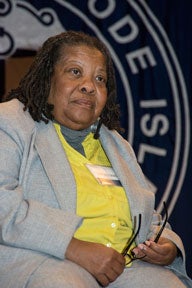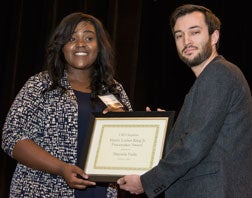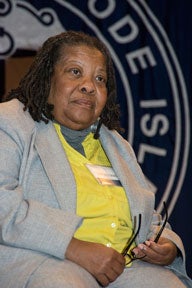 KINGSTON, R.I., Feb. 4, 2016 – She was thirsty. Cooped up in a sweltering jail cell for a week, Ruby Sales, a college student and civil rights worker, wanted a cold drink so she went to a local store with a friend, Jonathan Daniels.
KINGSTON, R.I., Feb. 4, 2016 – She was thirsty. Cooped up in a sweltering jail cell for a week, Ruby Sales, a college student and civil rights worker, wanted a cold drink so she went to a local store with a friend, Jonathan Daniels.
Thomas Coleman was waiting for them with his shotgun: “I’ll blow your brains out,” he snarled.
She felt a tug on her blouse. Daniels, a young Episcopal seminarian from New Hampshire, pushed her aside and took the bullet for her. His killing jolted her forever, turning her into an advocate for social justice, then and now.
Sales talked about the death of her friend—and racial troubles in the world today—during a Unity Luncheon Wednesday at the University of Rhode Island to honor Martin Luther King, Jr. About 100 faculty, students and staff attended the event in the Memorial Union.
About 50 years ago, Sales said she was a 17-year-old student at Tuskegee University, trying to decide if she wanted to become a housewife or a “beatnick.”
 One day, the civil rights activist Stokely Carmichael came to talk. “I had one of those light bulb experiences,” Sales said. She started to understand that she was connected to “history, people, struggle.”
One day, the civil rights activist Stokely Carmichael came to talk. “I had one of those light bulb experiences,” Sales said. She started to understand that she was connected to “history, people, struggle.”
In 1965, she traveled to rural Alabama to join other activists, including Daniels, to register African Americans to vote. Like many activists back then, she ended up in jail. “Torture is not an act of foreign countries,” she told the crowd.
Sales said she and other female activists were threatened with rape. And although she was sick with awful stomach cramps, the sheriffs refused to call a doctor. Her saving grace: the man in the cell next to her—Daniels. “We passed notes to each other,” she said.
Finally, after a week, authorities let Sales and her fellow activists go. It was a sweltering day—“the kind when you can feel the heat pulsating from the pavement.” She and Daniels went to get sodas at the “Cash Store” for everyone because “We were young, and we were thirsty.”
Coleman, a part-time deputy sheriff and construction worker, raised his 12-gauge shotgun and ordered them off the property. Daniels shoved Sales aside. Shots were fired. “I heard shotgun blasts, and Jonathan fell to the ground. I think to myself, ‘I must be dead.’ ”
“Ruby, Ruby, Ruby,” a friend shouted from an abandoned car. Sales crawled to cover. Daniels’ body was taken to the hospital in a hearse.
Despite the trauma and death threats, Sales testified at Coleman’s trial.
An all-white jury of 12 men acquitted him. “Tom Coleman never served a day in his life,” said Sales. But the outcome led to a legal challenge and, ultimately, changes in the jury selection process.
“I met Mrs. Daniels,” Sales said. “Oh, how my heart wept.”
Since then, she has devoted her life to social justice. A former college professor, she now heads SpiritHouse, a nonprofit group she founded that brings diverse communities together through spirituality. She is also one of 30 African Americans to be spotlighted in the new Smithsonian Museum of African American History and Culture.
Racism is as alive today as it was in a small town in Alabama half a century ago, she said. Many people are trying to undo what activists accomplished during the civil rights struggle. The recent killings of African American men by white police officers are especially troubling, she said.
And the anti-Islam and anti-Mexican presidential campaign rhetoric from Republican candidate Donald Trump has been “deeply disturbing,” with talk about “building walls, rapists and criminals coming in from Mexico.”
“I hear the souls of people wanting to make this country great again,” she said. “Greatness is not bullying. Greatness is the ability to stand side-by-side with one’s neighbor.”
She urged students to take risks: “Do not conform. Put a knapsack on your back and see the world. Challenge authority. Do something spectacular. This is an opportunity to do something grand for your country, to be in a world that is yet to be born. We are depending on you.”
Also at the luncheon, a student and student group received the annual Peacemaker Award: Manuela Vadis, a junior who is involved in the Multicultural Student Services Center, Talent Development and Big Brothers, Big Sisters of Rhode Island; and URI Standers, a group of student athletes dedicated to raising awareness about and reducing sexual assault and domestic violence.
The Unity Luncheon is held annually as part of Martin Luther King, Jr. Week. Melvin Wade, director of the multicultural center, thanked the Center for Nonviolence and Peace Studies, Office of Community, Equity and Diversity, Office of the Provost, Lyn-Baker Dooley, the Chaplains Association, and the School of Education for their assistance organizing the event.
Pictured above:
Ruby Sales, the keynote speaker at URI’s Unity Luncheon.
Manuela Vadis, a URI junior, receives the Peacemaker Award at URI’s Unity Luncheon. On the right is Adam Croft, campus chaplain with the Intervarsity Christian Fellowship.
Photos by URI staff photographer Nora Lewis.

